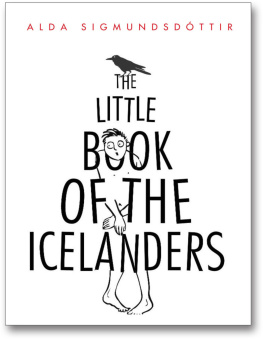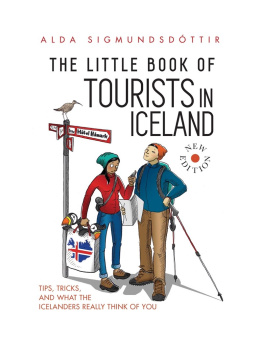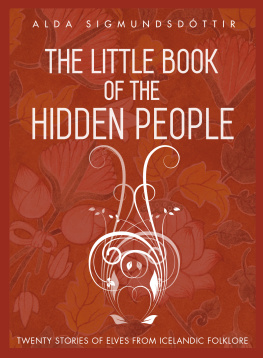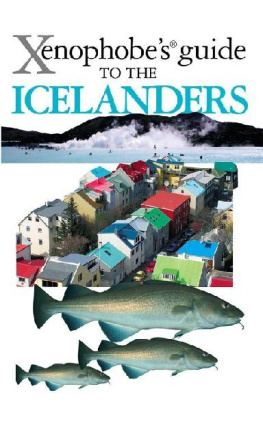Introduction
D issecting the psyche of a nation is a daunting task. It is also doomed to failure. Its absolutely impossible to make a claim about the Icelanders without someone popping up and saying, Yes, but but but Im not like that!
I dont drive like a bandit! I dont hate dogs! I dont invite 100 people to my birthday parties and pay for all the booze myself! I dont mix up my vs and ws! I know how to have conversations with people!
All of which will be true. Which is why we need to get something out of the way right now: this book is stuffed with sweeping generalizations and subjective opinions, armchair philosophies and random musings. No special studies were carried out in the writing of this book. And when I refer to the Icelanders I do so completely generically though I do like to think those statements will apply to at least a handful of Icelanders. Ideally the majority.
Plus, theres this: every time I think Ive found something concrete to say about the Icelandic national character, I come up against a paradox. The need for independence vs. the need to be connected. Among the happiest people on earth vs. consuming the greatest amount of anti-depressants of all the Nordic
countries. Well-travelled and cosmopolitan vs. hopelessly provincial. Grasping the national psyche of the Icelandic people is like trying to catch a slippery fish with your bare hands.
I moved back to Iceland in 1994. At that time Id just crawled out of my twenties and had lived abroad more or less since the age of five. I had a respectable command of Icelandic and no telling accent, an Icelandic name, and passed for a native in most respects. But make no mistake: I was a foreigner. Granted, I had my people here, but since I had not grown up with them, they were effectively strangers. And since Id not been a part of the Icelandic school system (apart from three hazy years between the ages of seven and ten) I didnt belong to any groups or cliques or even sewing circles those social constructs so ubiquitous among Icelandic women. This set me quite distinctly apart from most Icelanders, who tend to form those sorts of groups in elementary or secondary school and retain them more or less throughout their lives, for better or worse.
So because I had all the trappings of a normal Icelander, I was instantly regarded as one of us. But having been socialized on a different continent, I was completely ignorant of the many social customs and standards that prevailed in Icelandic society. This garnered me some pretty strange looks and even hostile reactions in those early days. I can still remember sitting in the coffee room at work one day, less than a year after moving back and after my first Christmas holiday, when everyone was talking about what they had served for dinner on New Years Eve. I said Id cooked some sa , or halibut. The room went silent and suddenly all eyes were on me. Some people even fidgeted, like Id said something very awkward. I was perplexed. What exactly did I say?
What I did not know then was that Icelanders do not eat mundane food like sa on New Years Eve. (Not even if they cook it in an extra-special way, like I did.) Both Christmas Eve and New Years Eve are steeped in tradition in Iceland, and that tradition dictates among other things that people need to cook something extraordinary on those days. In fact, what people plan to eat on Christmas or New Years Eve is a popular topic of conversation all through December, and beyond. Its the sort of thing you talk about at Christmas parties. When you run out of things like the weather.
In other words, tradition is of extreme importance to the Icelanders. So is conforming. Soon after moving back I rented a basement apartment from a lady who lived on the upper floor in the same house. She chose me from among several prospective tenants (rental properties were pretty hard to come by at the time and still are) because, as she put it, we just want to have people like us living here. It was put forth in a perfectly sweet and amiable manner, and describes rather well the prevailing sentiment in Icelandic society, where that which comes from outside is just a little bit uncomfortable. Alas, she found out to her dismay that I was not much like her at all and I think it upset her world view a little bit at least until I moved out and she was able to rent the place out to someone who was more her type.
Incidentally, I dont think most Icelanders realize to what extent those unwritten rules and customs govern their lives much in the way fish dont know theyre wet. Which I guess is normal, and understandable. There is a collective need among the Icelanders to stand together and not rock the boat something that is largely unconscious and which served the nation well throughout the ages, when peoples very survival depended on everyone doing just that. This togetherness also provides a sense of comfort and security that is reassuring in myriad ways. There is something inherently good in many of the prevailing traditions and cultural norms, like wrapping yourself in a warm, cosy blanket. But, like many other sources of comfort, there is a line you can cross, and when you do those things suddenly become self-defeating and even suffocating.
Most Icelanders realize this, and recognize the value of going abroad to live for a longer or shorter period. Indeed, the Icelandic word for stupid is heimskur , which is derived from the word heima , or home. In Iceland, the person who is heimskur is the person who has not left home.
A few words about the structure of this book. There isnt one. When I sat down and decided to write it I basically just wrote down 50 things that I thought were kind of quirky about the Icelanders, and went from there. Afterward I thought I probably should have tried to group things in a more organized fashion, with special chapters focusing on different aspects, like National Psyche or Quirks or Traditions or whatever, but the thought of going back and reworking things to fit into that sort of model seemed to me kind of self-defeating, like it might kill all the spontaneity. (OK, maybe I was just lazy.) Ive made a cursory nod in that direction by at least trying to cluster things together, with limited results, I fear. Most of this stuff is pretty random. Also, advance apologies: I seem to have been a little bit obsessed with names and naming traditions I have no idea why, but there are several blurbs with that sort of focus.
Incidentally, I should mention that this book was initially written for the readers of my now-abandoned blog, icelandweatherreport.com, who had come to be familiar with my sometimes warped humour and weird terminology. I tend to refer to Iceland as the Land of the Nice (or Niceland) which may be sardonic, or genuine, depending on the context. I also use cuss words, though when I need to use the really bad ones I give you the printed version of the beep (*) cause Im a laydee. Finally, you might occasionally find something resembling understatement or sarcasm or deadpan irony on these pages, which should be understood as either understatement or sarcasm or deadpan irony.
Also, this book that you now hold in your hands, read on your screen, or listen to on your device, is the second edition of The Little Book of the Icelanders . The first edition was initially published in 2010 and had, when eight years had passed from its publication, become somewhat dated. Most of the sections in this book are the same or similar to the original, but a few have been replaced or extensively updated to reflect social trends or changes.








